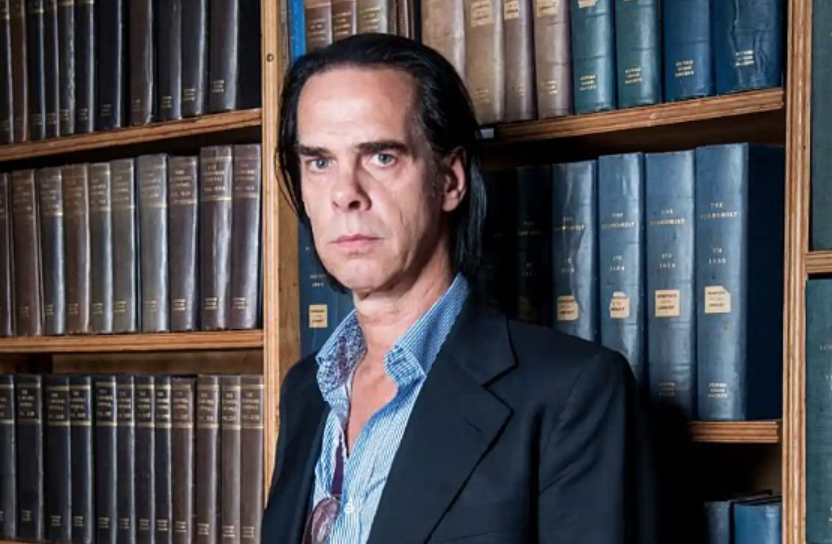But I was frankly hoping for a Lincoln Project ad about Trump and DeJoy trying to destroy the postal system, etc. They turn these things around in 24 to 36 hours. What’s the hold-up?
Daily
Son of Big Melt
Breaking: Every summer it gets a little hotter. Caused by a little thing called “climate change,” which doesn’t exist in the minds of Trump supporters. Two weeks ago many areas of Europe were besieged by temperatures around 40 centigrade, or just over 100 degrees fahrenheit. Some Parisians are saying it hasn’t been this bad since the heat wave of ’03, which, by the way, the boys and I experienced personally.
Talk about a summer of swelter. Jett had recently turned 15; Dylan was 13 and 1/2. We got through it, but barely. We had a third-floor walkup on rue Tourlaque, a block from the Cimitiere de Montmartre. A couple of days before the heat began, I slipped into a Castorama near Place de Clichy and bought three sizable fans. They restored our souls. If I hadn’t pounced when I did the fans might’ve been sold out, and we would’ve surely died.
To escape the jungle-like Paris air we decided to attend 2003 Locarno Film Festival. It began on Wednesday, 8.7.03, and closed ten days later. A smart, elegant, sophisticated gathering. Locarno is in southern Switzerland, of course, but it’s northern Italy in almost every tangible sense — culturally, atmospherically, architecturally. The gelato stands were a daily blessing.
I remember Roger Ebert‘s face being all pink and sweat-beady during an outdoor discussion panel. The guys and I were constantly soaked, of course. Every afternoon around 3 or 4 we took an hour-long dip in Lake Maggiore.
No Boxy “Jacket”, No Buy
It would be one thing if WHE’s forthcoming 4K UHD Bluray of Full Metal Jacket (out 9.21) offered the 1.37:1 boxy version as well as the standard 1.85. But it doesn’t.
Please understand there is only one way to re-experience this 1987 war classic, and that’s via the HD boxy version on HBO Max. (Which I happened to watch a portion of only a day or two ago.) It is absolutely the most visually pleasing version anyone will ever see. Perfectly framed. The head room is transporting. Nothing is cleavered or trimmed. Exactly the way Kubrick wanted it.
Same deal with Universal’s forthcoming 4K Psycho — no boxy version, no buy.
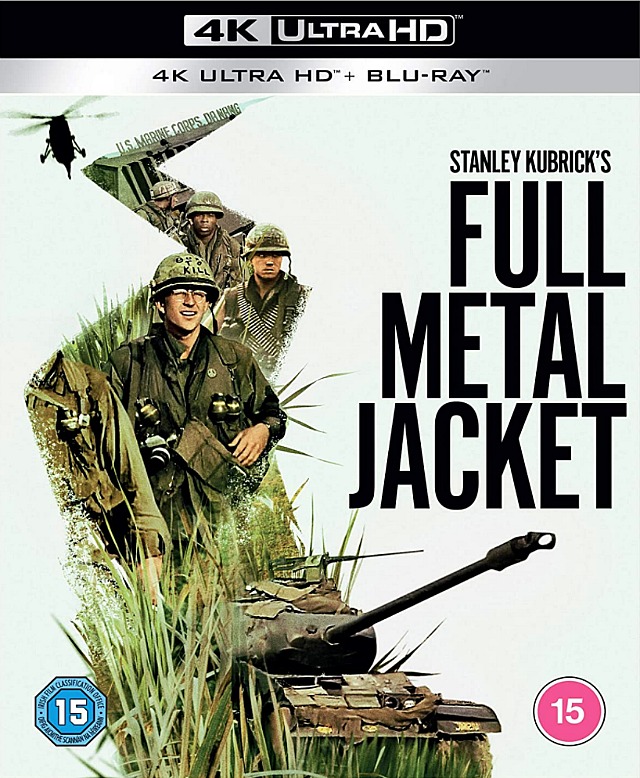
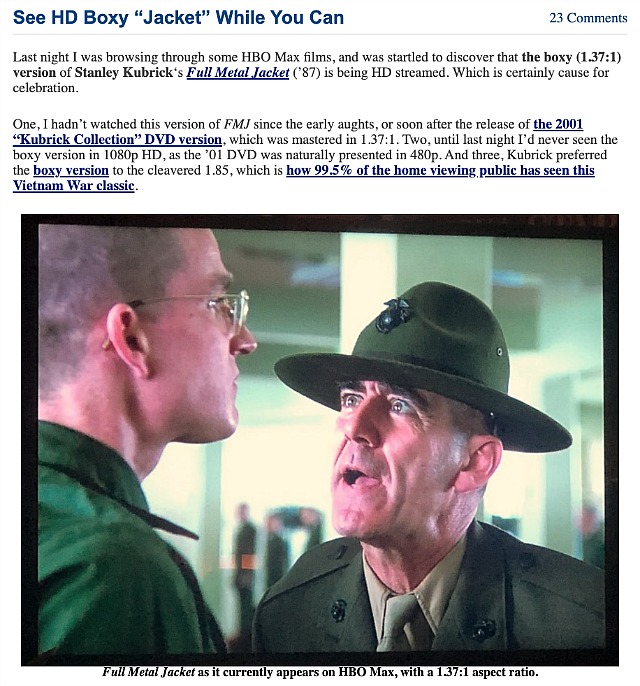
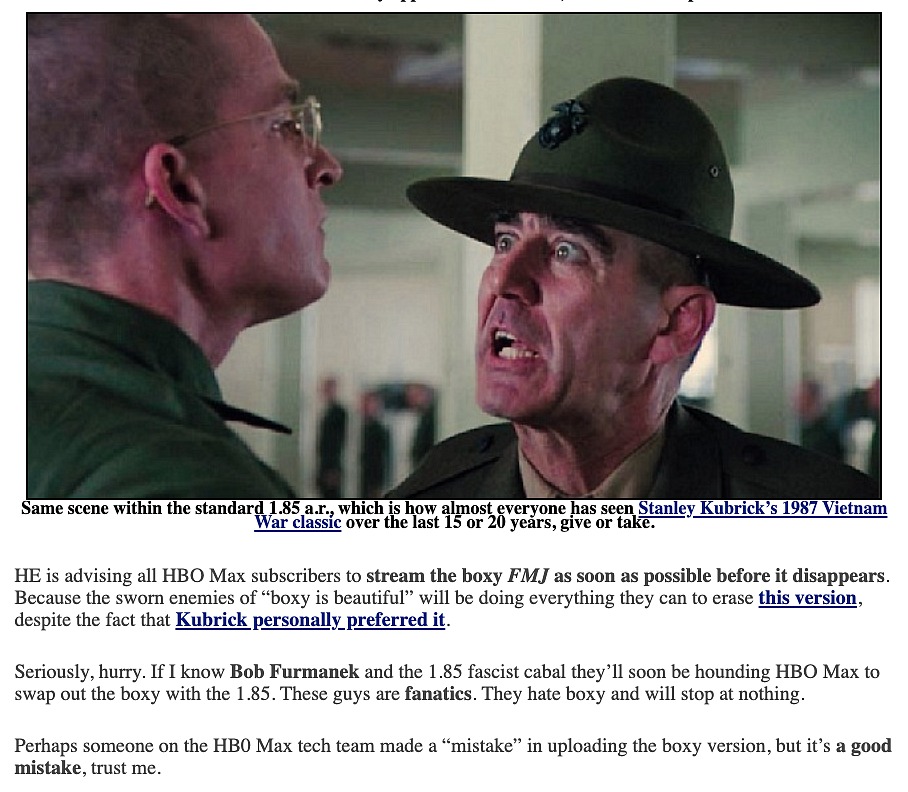
Rogue Gangster Mauling of USPS
Late yesterday afternoon I waited 40 minutes in a line at the Beverly Blvd. post office. Two or three people ahead of me were angry and complaining about bad service. When it was finally my turn, I asked the woman at the window if this is happening every day. Yes, she sighed. “Have you lost some personnel?” Yes, she said. “I’m sorry,” I said.

Which Is More Galvanizing?
I’ve been debating a text buddy as to which recent rant — Nick Cave decrying the “bad religion” of cancel culture and the Khmer Rouge or Bill Maher’s “cancel Jesus” riff — is more worthy of furrowed-brow contemplation.
10:02 am update: Where does Nic Cage stand on these topics?
Friendo: Cave’s article is important and eloquent.
HE: He’s just saying what many others have said, and will continue to say. A cutting-edge musician is repulsed by the Khmer Rouge — shocker.
Friendo: But in general you’re not posting remarks by people from the cool tribe. This will shame guys like Pete Meisel. There is no one cooler in the cool tribe than Nick Cave.
HE: Bill Maher’s “cancel Jesus when he returns” has my attention at the moment.
Friendo: Nobody in the cool tribe cares about Maher. Cave will shame them. To them Maher is an angry man yelling at clouds. The MSM won’t touch the Cave thing. Social media doesn’t touch anything that doesn’t align so you will at least amplify his message. Better than posting about Pink’s Hot Dogs.
HE: I happened to visit Pink’s late yesterday and decided to post photos on the spot. Plus Pink’s is an important, much beloved cultural landmark in this town. And age-ism is just as stupid and ugly and rancid as racism.
Friendo: Cave’s piece is a pie in the face for all of those assholes on your site who say there is no problem here. His entire essay on it is a beautiful thing. I should not have to be convincing you to do this.
HE: Okay, but there is no greater HE asshole commenter than “Jimmy Porter.” You can smell the dogshit on his shoes.
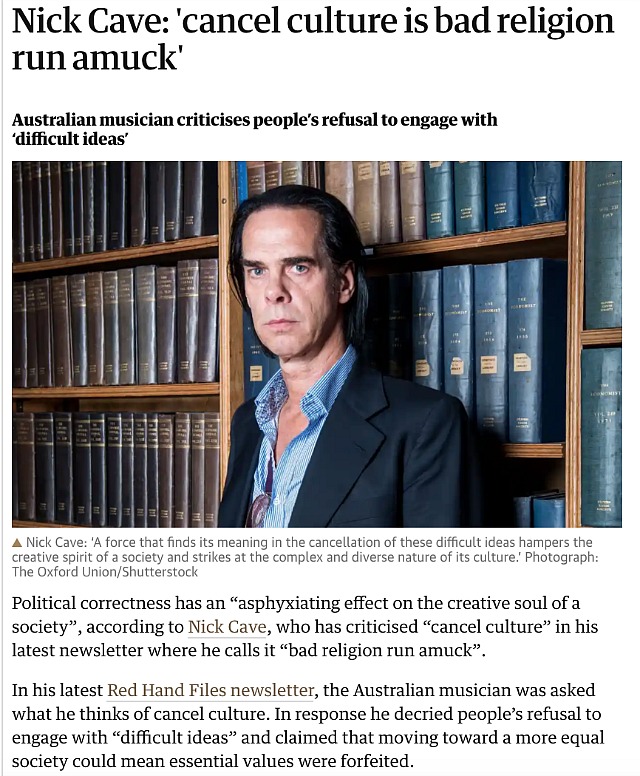
Talk About Too Soon
Linda Manz, Richard Gere‘s spunky younger sister in Days of Heaven, has died of lung cancer at age 58.
15 year-old Manz gave one of the 20th Century’s most indelible supporting performances in Terrence Malick‘s 1978 classic. Reciting Malick’s narration with that glorious New York street accent, smoking hand-rolled cigarettes, yanking feathers out of a dead chicken, laughing, lost in thought aboard a westbound freight train or on a boat cruising down a Texas river…perfection.
Manz played the lead role in Dennis Hopper‘s Out Of The Blue (’80), which I’ve only seen once. She was also in Phillip Kaufman‘s The Wanderers (’79) and Harmony Korine‘s Gummo (’97).
Manz’s final Days of Heaven line: “This girl, she didn’t know where she was gonna go or what she was gonna do. Maybe she’d meet up with a charactuh. I was really hopin’ things would work out for huh. She was a good frenna mine.”
Pinks Is Back
Mustard, onions, light on the chili…extra napkins, please? Cooks and wait staff wearing plastic face masks, etc. (Photo taken today at 5:28 pm.)


I’d Watch This Formulaic Family Flick…
…if Cheech Marin was the star rather than a supporting player.
All you need to know is that The War With Grandpa (101 Studios, 10.9) was directed by Tim Hill (The SpongeBob Movie: Sponge On The Run, Alvin and the Chipmunks). That tells you absolutely everything.
Trump Mulling Snowden Pardon?
HE to Edward Snowden, Oliver Stone (email sent a couple of hours ago): Edward & Oliver — Can you guys give me a quote about this just-breaking Trump/Snowden story, which hints that a pardon may be in the offing? Would a pardon from an obese sociopathic crime boss make it any less of a desirable thing from your perspectives?
Another “Marnie” Spat
A filmmaker friend sent me into a funk this morning. He managed this feat by declaring that he loves Alfred Hitchcock‘s Marnie, and insisting that it’s a “fantastic” film. My first reaction was “dear God.” My second reaction was to send him the following:
“No one is more passionate about film and other things than yourself, but Marnie? Please name one aspect of Marnie that truly and consistently works, in your view. Name one aspect that you regard as truly ‘fantastic.’
“Tippi Hedren delivered the brittle and repressed, but she couldn’t deliver the eros — it just wasn’t there. Hitchcock never admitted this in so many words, but he was looking to turn audiences on with Marnie. It’s a film about repression, constipation and memory panic, but he wanted Hedren to deliver ‘the volcano’, as he once said. But she couldn’t.
“Grace Kelly, whom Hitch had originally cast, might have succeeded in this regard.
“Those stilted scenes with her deranged mother (Louise Latham), that deadly on-the-nose dialogue, those absurd flashes of red, those awful process shots when Hedren is riding her horse, those almost comically fake backdrop paintings by Albert Whitlock, etc.
“You’re basically stuck with a lead actress who can never be healthy, never trust anyone, never have great sex, never breathe easy.
“I like Sean Connery’s performance, the Bernard Herrmann score, the suspenseful Act One robbery sequence.
“I appreciate that Marnie is as much about Hitchcock self-portraiture as Vertigo was. In actuality Hitch was basically Connery’s “Mark Rutland” character, an authority figure using power and pressure to get Marnie/Hedren to sleep with him. Rutland and Vertigo‘s Scotty Ferguson are both rooted in a pervy, twisted psychology. And their respective lead females are liars, fakers and unreliable narrators.
“The bottom line? Hitch adored his ice queens (‘There are hills in that thar gold’) but at the end of the day his main erotic fixation was upon food.”
Obama: Trump Trying To “Kneecap” USPS
First of all, how is it Friday already? I thought today was Thursday or possibly even Wednesday.
Secondly, in a podcast released today President Barack Obama told former campaign manager David Plouffe that Orange Plague is trying to “actively kneecap” the postal service” to affect mail-in voting in the 2020 election.

Third, Trump said yesterday that he’s against an emergency bailout for the U.S. Postal Service because “he wants to restrict how many Americans can vote by mail, putting at risk the nation’s ability to administer the Nov. 3 elections,” per an 8.13 Washington Post story.
And fourth, the Post story also stated that the Trump campaign and RNC “are reportedly working on a comprehensive legal strategy to challenge the election after Nov. 3.”

My Favorite Martins
On this, the occasion of Steve Martin‘s 75th birthday, I’m declaring that among my five favorite Martin performances only one could be called “broad” or “silly” — the All Of Me attorney with the split personality. The other four are the ill-fated loser in Herbert Ross‘s Pennies From Heaven (’81), the Larry Gordon-ish film producer in Lawrence Kasdan‘s Grand Canyon, “Neal Page” in John Hughes‘ Planes, Trains and Automobiles and the low-key con man in David Mamet‘s The Spanish Prisoner,
Honestly? I think his Spanish Prisoner guy might be my all-time favorite. Because I’ve always believed each and very word he says in that film, and yet the character is lying all the time. I’m sorry but I don’t like his silly stuff for the most part, and I don’t care that much for the domestic family comedies. I don’t know why I can’t remember much from Roxanne but I can’t.
Martin in Prisoner: “One thing my father taught me about business. Always do business as if the person you’re doing business with is trying to screw you. Because most likely they are. And if they’re not, you can be pleasantly surprised”


